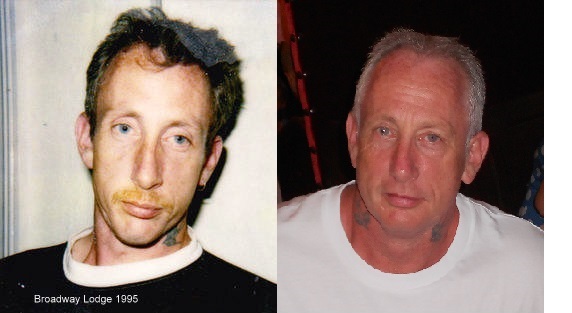I am the youngest of 3 children. My parents divorced when I was 14 and I lived with my mother until I was 16. Twenty plus years of active addiction took me to some dark places and I attended residential treatment when I was 34 years of age. I am now an accredited addictions therapist who has remained on the path of recovery. Now, at 55 years of age, I own my own residential treatment centre for addiction and mental health disorders in South Africa where I live with my wife and 2 children. Here is my story.
Addiction: ‘The search for love in all the wrong places with all the wrong people’. This is my summation of many years of addictive behaviour and substance abuse. Attention seeking was my initial undertaking in life and creating negative attention made my internal world a bit better and my external world worse.
Back in the madness of active addiction I experienced waking up on a hospital floor covered in my own urine, was at times physically too weak to feed myself so had to be fed like a child, even in my 30’s, I stole money from a blind pensioner, I went to prison, I did lots of things that I am certainly not proud of. I certainly did nothing glamorous, heroic or even meaningful, quite simply I existed and had no idea about life. My most prized possession in the world was a sweet tin that neatly displayed my required drug paraphernalia. I looked after this tin better than I looked after myself.
I went into residential treatment at Broadway Lodge in 1995 following an assessment which highlighted concerns for my mental health. I was jaundiced, underweight and completely directionless. I knew I was an addict but had never really considered being an alcoholic or a co-dependent. The identification rolled into my mind on a daily basis and this was overwhelming hidden beneath immature antics and a cavalier attitude.
My experience at Broadway Lodge was amazing and I still feel that the focus of the group and the high level of professionalism and support from Broadway Lodge staff largely contributed to the following successes in my life. The whole treatment centre seemed highly organised and felt very safe. My counsellor was a fantastic guy who was very humble and took a real interest in my malady.
My residential treatment was immediately followed by 18 months in a halfway house which was essential and further assisted me with self-development and much needed life skills.
I will never forget the day I left treatment. Yes, I had a halfway house to go to but in those final few minutes of residential treatment I was consumed with more feelings than I thought was humanly possible. I didn’t know whether to laugh or cry. Despite going to the halfway house I had no idea what the future held for me and I was more scared than excited.
Four years into recovery I was fortunate enough to train as a Chemical Dependency Counsellor at Broadway Lodge and this too was an incredible couple of years with some very special people. I am now an accredited addictions therapist who has remained on the path of recovery.
Over the past 19 years of recovery I have become more teachable, reasonable and more respectful of myself and my fellow man. I am not the ‘Rock’ I often thought I was but actually a vulnerable grain of sand that struggles to be part of the beach.
The gifts of recovery are probably many but I do not always have the capacity to recognise them. What is known to me is the gift of sight, i.e. looking ahead and not always at the floor! The gift of hearing an inner voice that is not always critical, the gift of peaceful sleep and pleasant dreams, the gift of insight and remaining teachable, the gift of having respect for my disease, myself and my family, the gift of acceptance that my father will never tell me he loves me, the gift of friendship with my mother, my wife and my children. Finally the gift of fear; the fear of relapse, rejection and death.
My advice for people in early recovery is to try and listen more and think less, keep it simple by addressing today instead of attacking the past and inventing the future. Allow yourself to sometimes look at the past but do not stare at it otherwise it will continue to consume you. Those who do not learn to understand and accept aspects of their past are sure to repeat it.
View next recovery story
Miracle Mansion Podcast: Stephen’s Story



